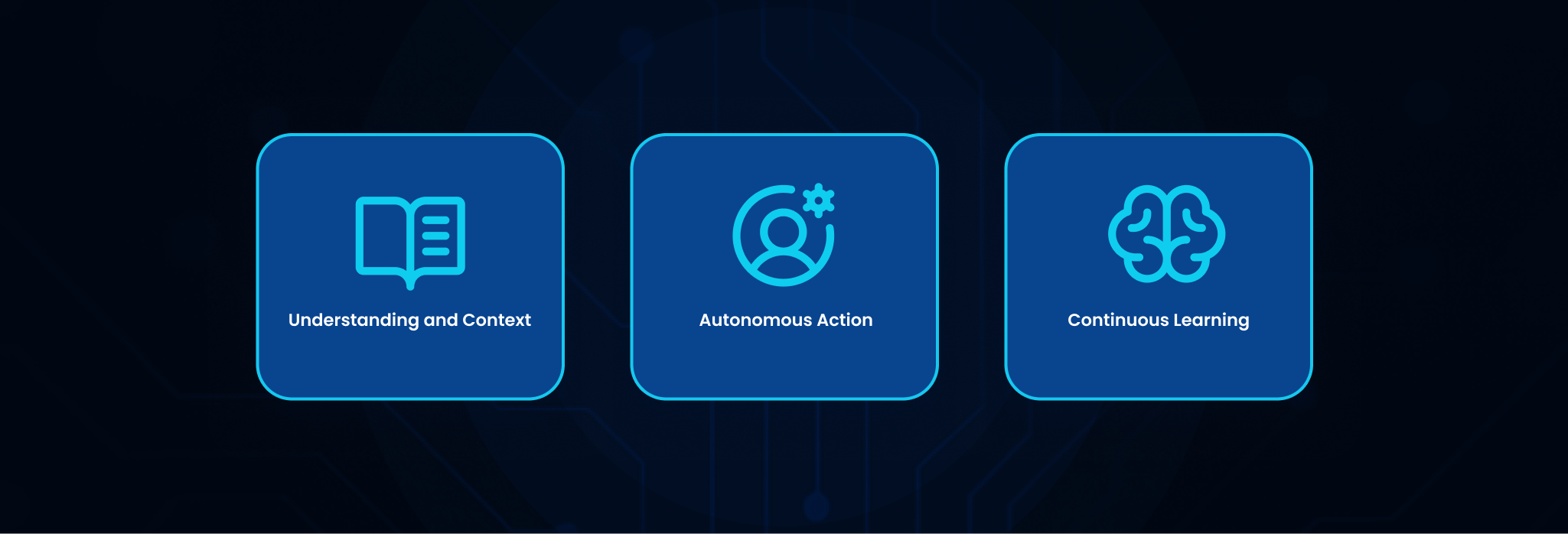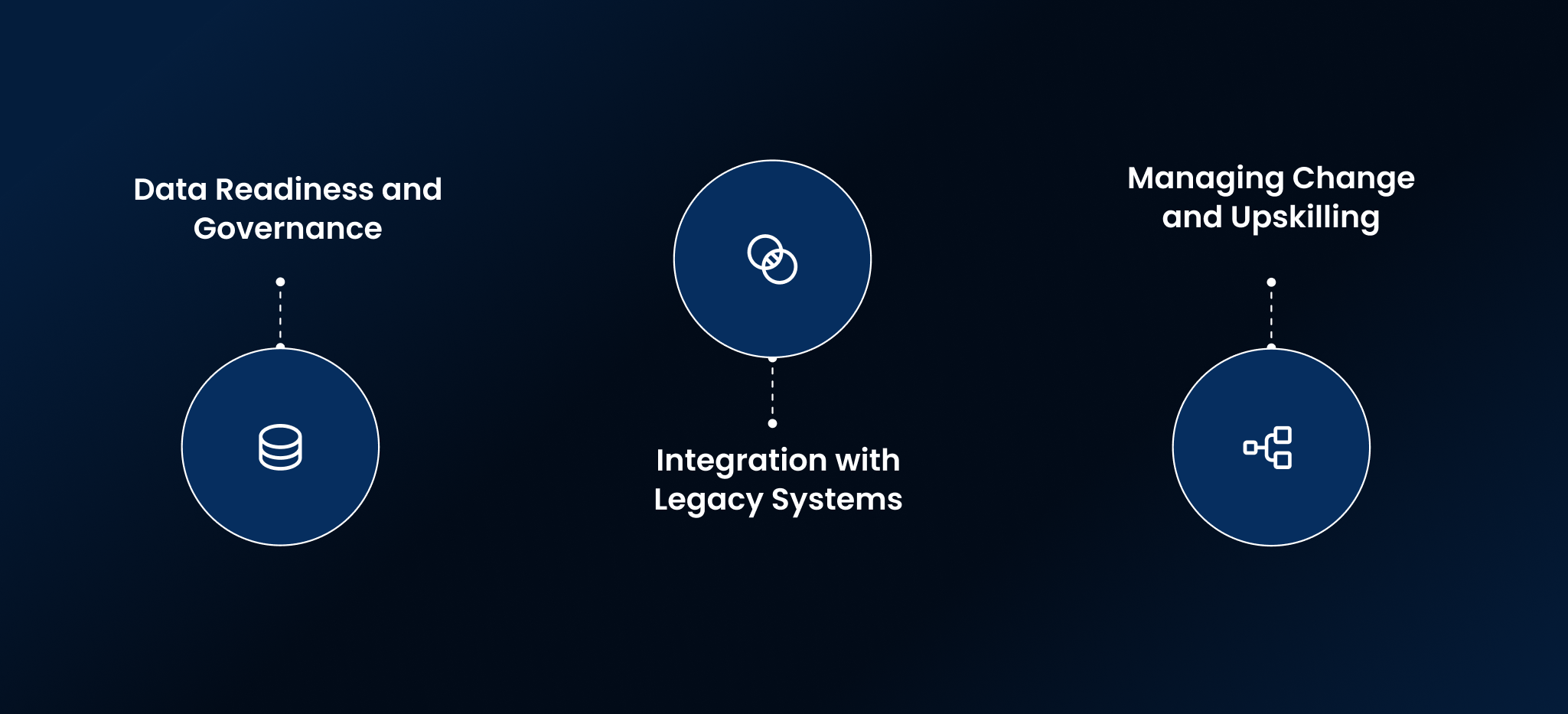Introduction
Welcome to 2025, where the conversation around Artificial Intelligence has fundamentally shifted. For today’s technology leaders, the question is no longer if AI will impact your organization, but how you will strategically build AI Enterprises to create a decisive competitive advantage. Gone are the days of isolated AI pilots and chatbots that simply follow a script. Instead, we’re now in the era of integrated, intelligent systems that can think, act, and solve complex problems on their own. This guide is your playbook for understanding this transformation and leading your company into the future.
What are AI Enterprises?
Think of traditional automation as a helpful checklist; it’s great at performing predefined tasks in a sequence. AI Enterprises, on the other hand, are more like a brilliant, autonomous team. They don’t just follow instructions; they understand intent, analyze context, and make independent decisions to achieve a goal.
At its core, an AI Enterprise is a business where artificial intelligence is woven into the very fabric of its operations, moving beyond simple automation to create a self-improving, autonomous ecosystem. For instance, instead of an employee filing an IT ticket for a locked account and waiting for a human agent, the AI system in an AI Enterprise understands the request, verifies the user’s identity through multiple systems, resolves the issue, and closes the ticket, all in a matter of seconds. Consequently, this shift transforms support functions from reactive cost centers into proactive, value-driving engines.
How AI Enterprises Operate
So, how does this actually work? Imagine an intelligent layer that sits on top of your existing business applications, your ticketing system, HR platform, and finance software. This layer acts like a central nervous system for your company.
- Understanding and Context: When an employee or customer makes a request, the AI doesn’t just see keywords. It uses natural language understanding to grasp the full context and intent behind the message. For example, it knows “My laptop is toast” means the user needs immediate hardware support.
- Autonomous Action: After understanding the need, the AI agent accesses different systems to solve the problem. It can check inventory for a new laptop, create a service request in your IT system, and even schedule a delivery, all without a single human touchpoint. This is the power of agentic AI, where the AI acts as an autonomous agent on the company’s behalf.
- Continuous Learning: Furthermore, every interaction makes the system smarter. The AI learns from each resolved ticket, identifying patterns to predict future issues. For example, if multiple users from the same office report Wi-Fi issues, the AI can proactively diagnose a faulty network switch and create a high-priority ticket for the network team before it becomes a widespread outage.
This interconnected, learning-based approach is what allows AI Enterprises to operate with unprecedented speed and efficiency.

Key Benefits of AI Enterprises for Businesses
Adopting an AI-first operational model isn’t just about cool technology; it’s about delivering tangible business results that directly impact the bottom line. As a technology leader, these are the outcomes you can expect.
- Drastic Cost Reduction and ROI: By automating the resolution of up to 80% of common IT, HR, and finance tickets, you can significantly reduce operational costs. Human agents are freed from repetitive tasks, allowing them to focus on complex, high-value strategic initiatives. The result is a clear and compelling return on investment.
- A Superior Employee Experience: In today’s competitive talent market, a frictionless employee experience is paramount. AI Enterprises provide instant, 24/7 support, eliminating frustrating wait times. Whether it’s a password reset at 2 AM or a payroll question on a holiday, your employees get the help they need, right when they need it, leading to higher satisfaction and productivity.
- Enhanced Operational Resilience: Predictive capabilities are a game-changer. The AI can analyze data streams to anticipate system failures, supply chain disruptions, or compliance risks. Consequently, your organization can move from a reactive “break-fix” model to a proactive, resilient one, minimizing downtime and business interruptions.
Common Use Cases of AI in Enterprises
The applications of AI within an enterprise are vast, but for leaders managing internal support systems, a few use cases stand out for their immediate impact.
- IT Support: This is where AI Enterprises often shine brightest.
- Autonomous Ticket Resolution: Handling everything from software access requests and VPN troubleshooting to hardware diagnostics and provisioning.
- Proactive Device Management: Alerting users about needed software updates or identifying that a laptop’s battery is nearing the end of its life and initiating a replacement order.
- Human Resources:
- Onboarding and Offboarding: Automatically provisioning system access for new hires or revoking it for departing employees, ensuring a smooth and secure transition.
- Policy and Payroll Questions: Providing instant, accurate answers to common employee questions about benefits, time off, and pay stubs.
- Finance and Procurement:
- Invoice Processing: Approving and processing vendor invoices that match purchase orders without manual review.
- Expense Report Audits: Automatically flagging out-of-policy expenses for review.
Challenges Faced by AI Enterprises
Of course, the journey to becoming an AI Enterprise isn’t without its challenges. Acknowledging these hurdles is the first step to overcoming them.
- Data Readiness and Governance: AI is only as good as the data it’s trained on. Ensuring you have clean, accessible, and secure data is a foundational requirement.
- Integration with Legacy Systems: Many large companies run on a mix of modern and legacy applications. Seamlessly integrating AI with these older systems can be complex but is crucial for true end-to-end automation.
- Managing Change and Upskilling: Introducing autonomous AI will change how your teams work. A clear strategy for upskilling your workforce to manage and collaborate with AI is essential for a successful transition. You’re not replacing people; you’re augmenting them.

How Leena AI Supports Enterprise AI Initiatives
Navigating these challenges is where having the right partner becomes critical. At Leena AI, we specialize in helping companies make the leap to becoming true AI Enterprises. We don’t just provide software; we provide a proven path to autonomous operations.
Our pioneering work in “Agentic AI in IT” is specifically designed for technology leaders like you. Leena AI’s platform provides pre-built, autonomous AI agents that plug directly into your existing environment, whether you use ServiceNow, Workday, or another platform.
For instance, our IT agent can handle complex, multi-step tasks that traditionally required a human technician. An employee can simply state, “I’m getting a new team member, and they need the standard marketing software package.” Leena AI understands this request, identifies the new hire in the HR system, provisions licenses for Adobe Creative Suite and Salesforce in the respective portals, updates the asset management database, and notifies the hiring manager upon completion. This is how we create immediate value, turning a multi-day, multi-touch process into a fully autonomous workflow that completes in minutes. AI Enterprises thrive on this level of efficiency, and Leena AI delivers it.
The Future of AI Enterprises
Looking ahead, the trajectory is clear. The AI systems of today are just the beginning. The future of AI Enterprises involves AI agents collaborating with each other to manage entire business functions with minimal human oversight. Imagine a scenario where an AI detects a potential cybersecurity threat, automatically isolates the affected systems, notifies the security team with a full diagnostic report, and simultaneously cross-references employee travel logs from the HR system to identify the potential source of the breach.
This level of integrated, autonomous operation is the ultimate vision of AI Enterprises. For technology leaders, the time to build the foundation for this future is now. By embracing agentic AI and rethinking your operational strategy, you can position your organization to not just compete, but to lead in the years to come.
Challenges Faced by AI Enterprises
Of course, the journey to becoming an AI Enterprise isn’t without its challenges. Acknowledging these hurdles is the first step to overcoming them.
- Data Readiness and Governance: AI is only as good as the data it’s trained on. Ensuring you have clean, accessible, and secure data is a foundational requirement.
- Integration with Legacy Systems: Many large companies run on a mix of modern and legacy applications. Seamlessly integrating AI with these older systems can be complex but is crucial for true end-to-end automation.
- Managing Change and Upskilling: Introducing autonomous AI will change how your teams work. A clear strategy for upskilling your workforce to manage and collaborate with AI is essential for a successful transition. You’re not replacing people; you’re augmenting them.

How Leena AI Supports Enterprise AI Initiatives
Navigating these challenges is where having the right partner becomes critical. At Leena AI, we specialize in helping companies make the leap to becoming true AI Enterprises. We don’t just provide software; we provide a proven path to autonomous operations.
Our pioneering work in “Agentic AI in IT” is specifically designed for technology leaders like you. Leena AI’s platform provides pre-built, autonomous AI agents that plug directly into your existing environment, whether you use ServiceNow, Workday, or another platform.
For instance, our IT agent can handle complex, multi-step tasks that traditionally required a human technician. An employee can simply state, “I’m getting a new team member, and they need the standard marketing software package.” Leena AI understands this request, identifies the new hire in the HR system, provisions licenses for Adobe Creative Suite and Salesforce in the respective portals, updates the asset management database, and notifies the hiring manager upon completion. This is how we create immediate value, turning a multi-day, multi-touch process into a fully autonomous workflow that completes in minutes. AI Enterprises thrive on this level of efficiency, and Leena AI delivers it.
The Future of AI Enterprises
Looking ahead, the trajectory is clear. The AI systems of today are just the beginning. The future of AI Enterprises involves AI agents collaborating with each other to manage entire business functions with minimal human oversight. Imagine a scenario where an AI detects a potential cybersecurity threat, automatically isolates the affected systems, notifies the security team with a full diagnostic report, and simultaneously cross-references employee travel logs from the HR system to identify the potential source of the breach.
This level of integrated, autonomous operation is the ultimate vision of AI Enterprises. For technology leaders, the time to build the foundation for this future is now. By embracing agentic AI and rethinking your operational strategy, you can position your organization to not just compete, but to lead in the years to come.
What is the main difference between business automation and AI Enterprises?
How do AI Enterprises handle data security and privacy?
Leading platforms for AI Enterprises, like Leena AI, are built with security as a core principle. They use enterprise-grade encryption, comply with standards like SOC 2 and ISO 27001, and provide robust access controls to ensure your data remains secure and private.
- Will implementing solutions for AI Enterprises require replacing our existing systems?
No, a key strength of modern AI platforms is their ability to integrate with the systems you already use. They act as an intelligent layer on top of your existing IT service management, HR, and finance software, enhancing their capabilities rather than replacing them.
- What is the typical implementation timeline for becoming one of the leading AI Enterprises?
What is the main difference between business automation and AI Enterprises?
Business automation typically follows pre-programmed rules to complete simple, repetitive tasks. AI Enterprises, in contrast, use intelligent systems that can understand context, make decisions, and learn from outcomes to handle complex, dynamic workflows autonomously.













